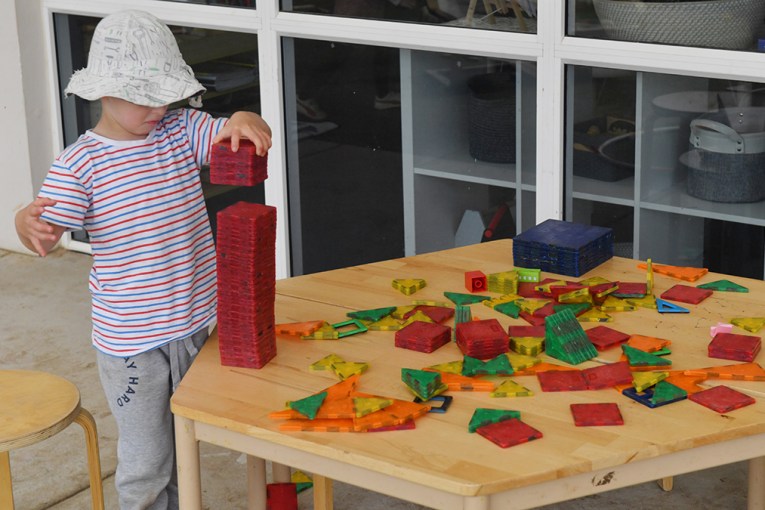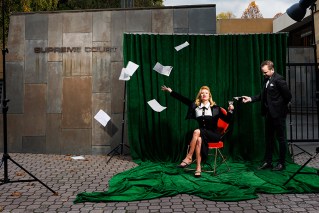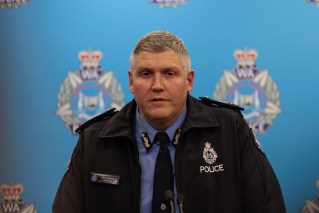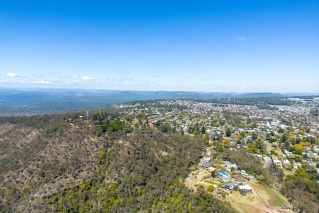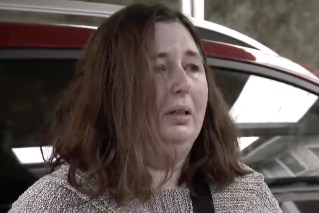I’ll never forget the sight of a white cloud forming like a mushroom in the sky before turning a deep red colour.
Like a nuclear bomb explosion.
After the blast, there was rubble everywhere, glass shattered and spread onto the streets, injuring and killing people.
I have been reporting on the difficulties in Lebanon for many years, but what I saw yesterday was unimaginable.
Beirut looked like a war zone.

The blast damaged buildings across the capital and shattered glass in many nearby neighbourhoods. Photo: ABC/AP/Hussein Malla
Where only minutes before there had been buildings and streets, now there was debris and broken glass. An apocalyptic scene.
As the injured were lying on the ground, many feared there might be further explosions.
Silence eventually gave way to chaos on the ground
Surprisingly, there were no screams, people were in shock.
For a few moments, there was an eerie silence. Then, slowly, some signs of life. People began getting up, trying to get their bearings and understand what had happened.

Some survivors had to be helped out of the rubble left by destroyed buildings. Photo: ABC/AP/Hassan Ammar
Adèle Mazedjian told me she was inside her home when she heard a deafening sound.
“I was in the kitchen preparing a meal when the explosion occurred,” she said.
It felt like Hiroshima. I had never ever imagined I would live such a tragedy. I am lost for words.”

Adele, 74, lives 500 metres away from the port and says plants she has been growing on her balcony for years were propelled into the house after the explosion. Photo: ABC News/Cherine Yazbeck
Initially, telephone communications were disrupted, adding to the distress and confusion felt by many who had heard the blast.
People could not reach their loved ones to find out whether they were safe. So they got in their cars.
For those that had been near the blast and escaped with minor injures, they wanted to return back home and check on their loved ones and the state of their houses.
For those at home or elsewhere, they got in their cars and flocked into the city from outside Beirut with the same purpose, unintentionally creating a traffic jam.

Many Lebanese helped with the evacuations of the wounded after the blast. Photo: ABC/AP/ Hassan Ammar
Amid the chaos, rumours began to spread as people speculated over what caused the explosion — some believed it could be a political assassination.
There were even accounts about Saad Hariri, the former prime minister, being targeted by an air attack.
Of course, it later emerged it was an accident. The cause of the explosion has not been fully determined yet and the Government announced an investigation is pending.
Fumes made it difficult to breathe
When I drove to the port area, all I saw was total devastation.
The blast had shattered all the shop fronts in the surrounding neighbourhoods.
I was surprised to also see groups of young men looting damaged shops and buildings.
Near the blast, a business owner was sitting in his showroom. It had been totally demolished.
But despite the overwhelming smell of chemicals, he was keen on remaining in order to protect his place from looters.

The main bus station in Mar Mikhaël was destroyed by the blast. Photo: ABC News/Cherine Yazbeck
Even though fumes made it difficult to breathe and made my eyes sting, I drove to Najjar Hospital in the Hamra district, 2 kilometres from the blast site.
There, I saw many people with minor injuries being discharged and trying to find a way back home.
I met a friend of mine whose father was covered in blood on a wheelchair, trying to find a taxi to take them to his sister’s home.
The father was distressed and did not want to go to a safe place as he was fearing his apartment facing the port would be looted.

Parked cars 200 metres from the port didn’t stand a chance against the force of the explosion. Photo: ABC News/Cherine Yazbeck
I offered them a lift, since there was no other means of transportation available, and drove them where they would be safe.
One manager of Najjar Hospital, who wanted to remain anonymous, said there were a lot of injured patients.
I have not witnessed such a high number of injured people needing urgent treatment,” they said.
“Not even during the civil war.”
Lebanese becoming accustomed to tragedy
In the aftermath of the explosion, people seem hopeless and resigned.
We have become accustomed to violent events, and the many troubles over the years have made us resilient to tragedy.
This latest catastrophe comes after a number of hardships for the Lebanese people, who have had to cope with the devaluation of the currency and the inability to draw money from their bank accounts.
The last couple of months has already been tough for a majority of families to make ends meet.
It seems we in Lebanon have been living in a state of emergency on a daily basis.
But nothing could have prepared us for this.
–ABC
